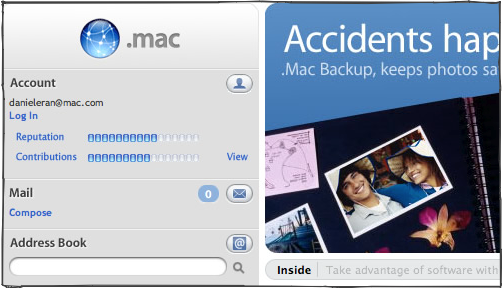

Apple's nebulous .Mac services were introduced in What the Heck is .Mac? In 10 Reasons Why Apple Can Kickstart Web 2.0 I presented why Apple is uniquely poised to actually deliver .Mac services well worth the price of admission. In this series, I'll describe features I think Apple needs to add to their .Mac service to move it from "web hosting and email plus" to a complete suite of services that are valuable, obvious, and will sell themselves to potential .Mac subscribers. Plus, I want to use them!
Borrows Ideas From:
The value of network, such as a news sorter website, is directly proportional to how much the network is used. To get people to use the hyperblog system I described in the last article, Apple would need a way to encourage members to regularly contribute. They also need a system to promote and recognize accurate, interesting, insightful, or otherwise useful contributions.
On Slashdot, contributors are rewarded through a reputation points system called karma. The audience is given turns to hand out karma using moderator points; awarded karma serves to raise the profile of individual's comments. It also makes it easier for readers to filter out noise; they can set a desired threshold for browsing, and see only stories or comments from users with sufficient community-awarded points.
Reputation becomes a richer basis for trust in an otherwise anonymous community. This principle is so useful in rating the value of an individual's contributions, that it's commonly found in commerce sites like Amazon or eBay, and in many tech advice discussion forums, including Apple's support forum.
Some tech analysts have doubted the potential value of user contributions to shared information sites, and the willingness of people in general to contribute to such a system. Still, very useful networks have sprung up based entirely on input from volunteers.
The best example is Wikipedia. It's not a institutional authority, but it has assembled and organized information on a bewildering range of topics that more traditional resources have neither the resources nor the interest in covering. A related example is Apple's own iTMS, which is brimming with user comments.
The MMORPG World of Warcraft cut deeply into the world's collective productivity last year, after throngs of nerds put their social lives, career advancement, and contributions to open source projects on hold in order to spend hundreds of hours running through a barren virtual world to kill talking pigs, collect materials, and fashion magical goods to sell in a virtual marketplace.
The main goal in WoW is to progressively expend resources to work up through a number of levels, while being rewarded with new, imaginary powers and the allusion of wealth, just like Scientology. However, the collective contributions of all those players, who individually paid more than double the price of .Mac join in, subsequently vanishes into thin air, rather like a WMA music collection, after they let their subscriptions lapse. Poof!
Imagine if a small fraction of those people contributed to a system that not only fed their self esteem and sense of virtual accomplishment through progressive leveling, but actually helped make the web a more useful, informative, and safer place.
Apple could build upon existing services because, Apple has (1) the users, and (2) owns the platforms to roll it out. The system is (3) given away for free, as part of .Mac, which users (6) trust. Further, Apple has proven they can build things that (7) work, are (8) usable, (9) very cool, and (10) will actually get finished.
Here's how it works:
Apple needs to integrate its existing support forums and comment submissions in the iTMS with my hyperblog web tagging concept for .Mac. All three systems, along with various other authenticated sites Apple runs, are already tied to .Mac accounts (aka Apple ID).
Currently, each of Apple’s various secure websites requires a separate login. Since most of these sites are WebObjects applications, the URL of their initial long pages often changes, making it frustrating for users who want to automatically login with the account details saved in their browser. Apple should build a control for these sites that can authenticate against the member’s saved .Mac credentials to make a single sign, particularly for their own properties (ADC, Certifications, Repair status, etc.), and possibly as a service to third parties, too.
Once logged in, an integrated reputation system would reward users for their useful contributions, regardless of where they were made. Members would have the tools to rank the usefulness of other member’s comments, and all those rankings would be aggregated on Apple’s servers to assign a relative ranking for each member.
End users would also benefit from such a reward system, by being able to set their own quality ranking threshold when viewing the comments and content submitted by the .Mac community at large. 

Members could even earn specialty rankings in specific areas, such as general technical savvy (earned in the support forums) or a special insight in emerging musical acts (iTMS). Apple would get more .Mac subscribers, and members would get recognition for finding interesting sites on the web, talking about them, and creating other content that enriches the value of the network.
Another unique feature Apple can add comes from the security of Apple's .Mac membership. Reputation systems can plagued by attacks from fake identities, called sybils, that are created to falsely raise reputation ratings by generating fake links between sybils. The membership for .Mac is a barrier to entry against sybils, making such an attack impractical.
The world already knows how vocal and opinionated Mac users can be, but with a .Mac reputation system in place, rather than barking at columnists who have built a career on spreading misinformation and FUD, those same users could devote their energies toward highlighting and critiquing real content on the web.
 Bang! Not only would they gain recognition for their efforts, but the rest of the world would stand to benefit. Individual web surfers would be armed with more information to evaluate the web with, as would search engines, spam filters, fraud prevention systems, and other innovative applications of aggregated metadata.
Bang! Not only would they gain recognition for their efforts, but the rest of the world would stand to benefit. Individual web surfers would be armed with more information to evaluate the web with, as would search engines, spam filters, fraud prevention systems, and other innovative applications of aggregated metadata. But that's only the start!

| | Comment Preview
 Read more about:
Read more about:

 Send |
Send |

 Subscribe |
Subscribe |
 Del.icio.us |
Del.icio.us |
 Digg |
Digg |
 Furl |
Furl |
 Reddit |
Reddit |
 Technorati
Technorati
Click one of the links above to display related articles on this page.
Fixing .Mac - Idea 2: A Reputation System
Monday, June 19, 2006




















